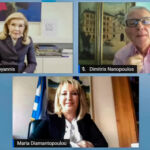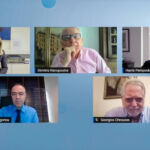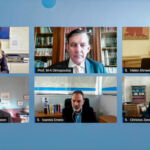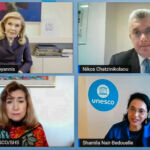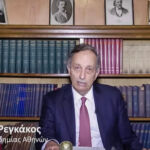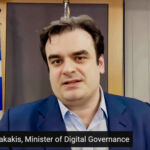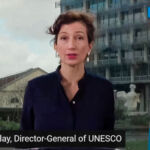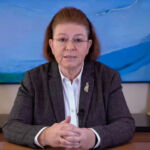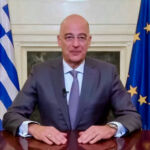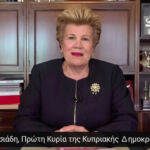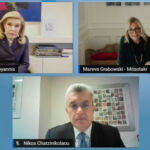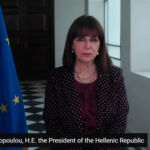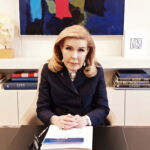VIRTUAL ROUND TABLE
‘UNESCO: Open Science – Artificial Intelligence. New Horizons, Visions and Boundaries’
Athens, 15 February 2022
The two major issues of TOMORROW: Open Science and Artificial Intelligence were the focus of the Virtual Round Table ‘Open Science-Artificial Intelligence: New Horizons, Visions, and Boundaries, which was co-organised by the ‘Marianna V. Vardinoyannis Foundation’ and ‘ELPIDA-Association of Friends of Children with Cancer’, under the auspices of UNESCO, on Tuesday, 15 February 2022, on the occasion of International Childhood Cancer Day.
The purpose of the event was to present to the Greek scientific community and the Greek public the two new UNESCO Recommendations on ‘Open Science’ and ‘Artificial Intelligence’, which were adopted in November 2021 during the 41st General Conference of UNESCO.
Leading Greek scientists accepted the invitation of Mrs. Marianna V. Vardinoyannis, UNESCO Goodwill Ambassador, and their participation sent the powerful message that if science and modern technologies, which are transcending the human mind, are utilised correctly, shared fairly, and have boundaries set on the basis of Ethics and Humanity, then they will serve as valuable “weapons” against the great challenges of our time, one of which is dealing with cancer. This is why, as Mrs Vardinoyannis emphasised, “the presentation of the Recommendations took place on the symbolic International Childhood Cancer Day; to send a strong message of optimism that childhood cancer must and can be defeated.”
INTRODUCTION AND OFFICIAL ADDRESSES
“The wager is to succeed in adapting modern transformations to human values and needs” H.E. the President of the Hellenic Republic Ms Katerina Sakellaropoulou
The event opened with an address by H.E. the President of the Hellenic Republic, Ms Katerina Sakellaropoulou, who congratulated Mrs Vardinoyannis on this important initiative, characterising her “a pioneer in approaching the new challenges of our times”, while she stressed:
“In this new, largely uncharted period we are going through, one of the greatest social and epistemological challenges is the management of scientific knowledge, free access to its discoveries, its fair and democratic sharing, and, mainly, the preservation and further strengthening of its anthropocentric direction. No technology is neutral and no technology is free from threats. This is why the dialogue between society and science in Greece is so important, providing information about the opportunities and risks created by new technology and artificial intelligence. The wager is to succeed in adapting modern transformations to human values and needs. Open Science promotes transparency and interdisciplinarity, it makes scientific findings more efficient and reliable, and it contributes to the development of innovation and the resolution of critical and global problems, such as the fight against childhood cancer, through the application of artificial intelligence in regenerative medicine.”
“To ensure a human and moral science” Marianna V. Vardinoyannis
Mrs Marianna V. Vardinoyannis, Goodwill Ambassador of UNESCO and President of the “Marianna V. Vardinoyannis Foundation” and “ELPIDA Association of Friends of Children with cancer”, in her introductory speech, stressed that both Open Science and Artificial Intelligence can become valuable “weapons” in the face of the great challenges of our time, such as cancer, underlining, however, the need to set boundaries for and correctly use these new technologies: “We have not chosen to present the UNESCO recommendations on these pioneering issues today by chance, as we are celebrating International Childhood Cancer Day. Through this event we are looking to the future, our hearts and thoughts are close to all children suffering from cancer, and we wish to send a powerful message of optimism: That Open Science and Artificial Intelligence are becoming the new “weapons” in the battle of our children to win back their lives. The UNESCO Recommendation on Open Science marks the beginning of an era of maturity for humanity, for the liberation of scientific knowledge and equal access to it. On the other hand, the rapid development of artificial intelligence, with its wonderful capabilities exceeding our imagination, opens up new horizons in all sectors. A new reality that creates the need for a new legislative framework and new ethics, while at the same time making it mandatory that we all learn about these new standards. This is the only way to ensure human and moral science. At the service of humanity and our planet, and not the other way around, which will contribute to the goals of sustainable development and safeguard humanity against an uncontrolled course towards the future. The two UNESCO recommendations we are presenting to you today are the first step in that direction. We are facing a new era of inconceivable progress and unknown risks. The implementation of the two recommendations by the 193 member-states of the Organisation will judge the great wager of our time and of modern societies.
“Artificial intelligence can change the future of healthcare” Andri Anastasiades
The event was addressed by Mrs. Andri Anastasiades, First Lady of the Republic of Cyprus, who noted that Artificial Intelligence and new technologies can change the future of healthcare if they are utilised correctly: “Through facilitating universal access to scientific research and research data, and through the utilisation of Artificial Intelligence, always in an ethical context, there is no doubt that the path is now open in dealing with many problems faced by local communities and the whole of humanity. This also clears the path to combating childhood cancer. Doctors are no longer alone in the struggle, because Artificial Intelligence, as a great new weapon in the battle against cancer, can more quickly develop new therapies, new drugs for preventing and treating cancer, and provide better care for patients. In this context and bearing in mind that the battle against cancer is a battle we must fight together, hundreds of children will now gain additional hope, which will turn into strength and hope, so that they can fight and emerge victorious from this challenge. It is for these reasons that artificial intelligence can change the future of healthcare. We should capitalise on Artificial Intelligence solutions so that they are at the forefront of health systems, while always setting the boundaries and rules of morality as a measure.”
“Speed is not all that matters in this race. The direction of each runner is also important” Mareva Grabowski-Mitsotakis
In her address, Mrs. Mareva Grabowski-Mitsotakis, wife of H.E. the Prime Minister of the Hellenic Republic Mr. Kyriakos Mitsotakis, stressed the importance of focusing on technological developments: “All active citizens, especially those who are not professionally involved in technology and science, I think they have to seek out the right tools to help them navigate the unmapped landscape that is opening up before us. And, upon realising the current demands, they should seek solutions within this framework. Our country has already entered the race of the 4th Industrial Revolution. Through investments in innovative sectors. With the digital transformation of the State. And, mainly, through the age-old gift of the residents of this land: the participation of Greek talent in this global development. But speed is not all that matters in this race. The direction of each runner is also important. The ideas that motivate them. The goals that inspire them. Because there can be no real progress without humanity at its centre. Nor, therefore, can there be Artificial Intelligence if it does not serve humanity’s own, healthy mind.”
“In the 21st century unequal access to knowledge, medical care and healthcare is unacceptable” Audrey Azoulay
In her address, Mrs Audrey Azoulay, Director-General of UNESCO, expressed her warm thanks to the organisers for this very important initiative. Mrs Azoulay made a reference, as an example, to the unequal access to treatments for childhood cancer between children from developed and developing countries: “We live in a time where the world is facing unprecedented challenges, which affect humanity as a whole. Some of these challenges are far too familiar, as we are reminded on this international day against childhood cancer. Every year, 400,000 children are diagnosed with this disease. Every one of these children deserves the best possible care, the best chance to live a full and happy life. Yet they do not all have equal access to cancer treatment. In low- and middle-income countries, treatment is often unavailable or unaffordable. In these countries, only around 30% of children with cancer survive, compared to over 80% in high-income countries. In the 21st century, these inequalities in access to knowledge, care and treatment are unacceptable. Every person has the right to enjoy the benefits of scientific progress. This is enshrined in the United Nations Declaration of Human Rights. And it is at the core of two new standard-setting instruments unanimously adopted by UNESCO’s 193 Member States in November 2021.
The first, our Recommendation on Open Science, aims to make science more accessible, transparent, inclusive and collaborative, so that it benefits all societies, so that scientific progress is shared between the Global North and the Global South.
The second, our Recommendation on the Ethics of Artificial Intelligence, seeks to unlock the potential of AI – for example in treating diseases like cancer – while respecting human dignity and human rights.
These Recommendations chart a path forward – now we need the world to walk down it.
By discussing concrete applications of these Recommendations, this is what you are doing – and I thank the “ELPIDA Association” and the “Marianna Vardinoyannis Foundation” for this opportunity.
Together, we can ensure that these two new legal frameworks make a difference in levelling inequalities for children with cancer across the world.”
“Open Science is a field of social participation” Nikos Dendias
In his address, Mr. Nikos Dendias, Minister of Foreign Affairs of the Hellenic Republic, described Open Science and Artificial Intelligence as answers to the great challenges of our time: “On a global level, Science is transforming into Open Science. Open Science will no longer be a privilege and an exclusive right of the scientific community. On the contrary, it will become a field of social participation. This will enable citizens and communities to shape research priorities together; and to play an active role in its development… At the same time, Open Science is a key European Union priority. It is also recognised as a critical accelerator for achieving the UN Sustainable Development Goals. Scientific research led to, among other things, a rapid increase in Artificial Intelligence applications. The UNESCO Recommendation on the Ethics of Artificial Intelligence responds to the new challenges that arise. It stresses the advantages Artificial Intelligence offers to society and seeks to reduce the risks it entails…”
“An immediate and radical paradigm shift is required, which will include science that is open and universally accessible” Lina Mendoni
Ms Lina Mendoni, Minister of Culture and Sports of the Hellenic Republic, referred to the importance of UNESCO’s adoption of the two Recommendations in order to respond to global challenges:
“In a context of entrenched globalisation and the deepening of the interaction and interdependence of economies and societies, it is becoming increasingly apparent that existing correlations and limitations of access to the achievements of science and knowledge cannot ensure joint and overall growth and progress, which are a prerequisite for harmony and the peaceful coexistence of peoples, as well as for a sustainable future in the long term. An immediate and radical paradigm shift is required, which will include science that is open and universally accessible, receptive to cooperation, transparency, accountability, full democratisation and inclusiveness. These principles are all the more important given the unprecedented changes that the revolutionary new applications of Artificial Intelligence technologies are expected to bring in all sectors. These applications are expected to create huge potential and prospects, while also presenting new dilemmas, challenges and risks to humanity.”
“It is very important to look at the role technology can play in strengthening humanity, in resolving major and profound problems” Kyriakos Pierrakakis
In his address, Mr Kyriakos Pierrakakis, Minister of Digital Governance of the Hellenic Republic, stressed that “technology is the means, not an end in itself” and he continued: “Today is the day against childhood cancer and we should congratulate the ‘Marianna V. Vardinoyannis Foundation’ and the ‘ELPIDA’ Association of Friends of Children with Cancer on this initiative. It is very important to look at the role technology can play in strengthening humanity, in resolving major and profound problems we are facing in the field. In this sense, as a Ministry, we very often say that: ‘technology is simply a means, not an end in itself’. The UNESCO Recommendations, which will be discussed today, are very important as regards artificial intelligence and the way it can be used in the specific problems we are trying to resolve in the field. In this sense, once again, the organisers of the event and all the participants deserve our heartfelt congratulations”.
“We need anthropocentric rules that ensure the correct, fair, and beneficial use of artificial intelligence for the whole of humanity” Antonios Regakos
Professor Antonios Regakos, President of the Academy of Athens, congratulated Mrs Vardinoyannis on this important initiative, stressing that the Academy of Athens will support her efforts and he referred to the need for an institutional framework around the crucial sectors of Artificial Intelligence and Open Science:
“The topic of today’s event, ‘Open Science’ and ‘Artificial Intelligence’, concerns the global scientific community and all of human society. Artificial Intelligence, the first expression of which were those mythical automatons of the god Hephaestus in the famous 18th rhapsody of the “Iliad” or the self-propelled vessels described in the “Odyssey” by our great Homer, is changing and will continue to change our lives in many sectors, primarily health, the environment and security. The benefits from its implementation are immeasurable, but there are also many potential risks, as UNESCO and the European Union have highlighted with equal emphasis. We need anthropocentric rules that ensure sound, fair and beneficial use of artificial intelligence for all of humanity. Equally useful is the issue of Open Science, the movement that aims to facilitate universal access to scientific research and its findings. But in this sector, too, rules and initiatives for the equal and transparent sharing of information and the democratisation of knowledge in general must be adopted.”
PRESENTATION OF THE RECOMMENDATION ON OPEN SCIENCE
“Without technological innovation and science we will not be able to achieve any sustainable development goals set by the UN” Shamila Nair Bedouelle
Ms Shamila Nair Bedouelle, UNESCO’s Assistant Director-General for Natural Sciences, presented the Recommendation on Open Science adopted by UNESCO in November 2021, which concerns equal and fair access to scientific knowledge, so that science can become our “common weapon” in confronting all of the major challenges of our time:
“Without technological innovation and science, we will not be able to achieve any sustainable development goals set by the UN. Science is at the heart of development goals, whether in terms of health, agriculture, the pandemic, or climate change. But there is a gap because there is inequality between countries in terms of R&D spending and this results in a gap in access to health services and various other services. Open Science is a movement that started years ago, regarding the transformation, the democratisation of the entire scientific process of access to scientific information, and the fulfilment of the human right to science, in accordance with the Declaration of Human Rights. Therefore, Open Science is increasingly recognised as an accelerator for the achievement the sustainable development goals. UNESCO aims to create a more peaceful world, increase equality and transparency, and strengthen diversity and inclusiveness, so Open Science must be transparent, high-quality, available in all languages, and offer parity. The Recommendation is actually a mandate for developing this international tool for Open Science. Because there was a need for an international policy framework, and only an International Organisation like UNESCO could take such a step.”
PRESENTATION OF THE RECOMMENDATION ON THE ETHICS OF ARTIFICIAL INTELLIGENCE
“We shouldn’t just be interested in being the first to make technological discoveries; we should be interested in being the first to make technological discoveries with a human face, so as to ultimately help Humanity!” Gabriella Ramos
Ms Gabriela Ramos, UNESCO’s Assistant Director-General for the Social and Human Sciences, presented the UNESCO Recommendation on ‘The Ethics of Artificial Intelligence’, which was adopted by UNESCO in November 2021 and it is an innovative roadmap, as it is the first time an ethical framework is defined, on a global level, with regard to the use Artificial Intelligence:
“This Recommendation is something excellent that concerns us all, because Artificial Intelligence is already everywhere. Due to the pandemic, we now all live in the digital world. In most countries many jobs are already being created that concern Artificial Intelligence and Information Technology, and this trend will continue. Especially in the health sector, Artificial Intelligence and computer systems can help significantly with issues such as cancer and cancer diagnosis. But we know that, at the same time, there are many risks, unwanted results, and that is why there must be a very strong ethics framework. But how is this ethics framework defined? We are talking about full respect for human rights and human dignity, through the UNESCO Recommendation. People must control this new technology. It should be shaped in a way that ultimately helps states and societies. We shouldn’t just be interested in being the first to make technological discoveries; we should be interested in being the first to make technological discoveries with a human face, so as to ultimately help Humanity!”
The first part of the event was moderated by Mr. Nikos Chatzinikolaou, publisher of the “Realnews”.
After the presentations, two Panels followed with the participation of leading Greek scientists, who exchanged views on the new horizons opened up by free access to scientific knowledge and by Artificial Intelligence, as well as on the boundaries that must be set for safely guiding our steps on the path to the future.
PANEL 1: OPEN SCIENCE IN THE NEW ERA
“Open Science is a change in system that allows for better science through open and collaborative methods of producing and sharing knowledge and data” Meletios-Athanasios Dimopoulos
The topic of the First Panel was ‘Open Science in the New Era’. The Panel was chaired by Professor Meletios-Athanasios Dimopoulos, Rector of the National and Kapodistrian University of Athens, who congratulated Mrs Vardinoyannis on her initiative, while he underlined the value of sharing knowledge in ensuring scientific progress on all levels:
“Dear Mrs Vardinoyannis, I would like to thank you warmly for this excellent initiative, because we all realise the great importance of these issues in today’s world. ‘Open Science’ as declared by the European Commission, is a change in system that enables better science through open and collaborative methods of producing and sharing knowledge and data at the earliest possible stage in the research process, as well as communicating and sharing research programmes. This new approach impacts research institutions and scientific practices, highlighting new methods of funding, evaluating, and rewarding researchers. It increases its quality, impact, and scientific nature. It makes science more effective through better sharing resources and more reliable through better verification, providing a better response to society’s needs.”
“Open science is an achievement of peace and the service of moral necessity” Helene Glykatzi Ahrweiler
The first speaker, Rector Helene Glykatzi Ahrweiler, President of the European Cultural Centre of Delphi, speaking on the topic “Open Science and Education”,stressed the importance of equal and universal access to knowledge, through education: “When you consume a good that you are not depriving from anyone else, such as air, for example, we call it a global good. In this sense, knowledge is the fundamental global good. There is, thus, a sharing that makes those who share richer. These are the people who share their culture with each other. We call this sharing, this cultural phenomenon, acculturation (with two c). It means going towards another’s culture (ad culturam), namely, giving to and receiving from each other. By sharing knowledge we become wealthier and structured knowledge is science… To serve Open Science means giving my colleague a helping hand, no matter how far away we might be. Open Science is an achievement of peace and the service of moral necessity. It requires both knowledge and education. But I should also mention that open science is an exercise in being virtuous continuously and on a daily basis.”
“Without Open Science, it is obvious that humanity would not be able to appreciate and understand the magnitude of climate change” Christos Zerefos
Professor Christos Zerefos, General Secretary of the Academy of Athens, Head of the Research Centre for Atmospheric Physics and Climatology of the Academy of Athens, Climate Envoy for Greece, spoke about ‘Open Science and Climate Change’: “Science (episteme), from the Greek verb epistamai, meaning “to know well”, is by definition Open. The climate crisis caused by humanity cannot be studied without the use of modern scientific methods, with simulations by high-tech and highly scientifically accurate models called climate models. Our current knowledge about humanity’s impact on climate and the environment in general, is based on this branch of science, which is constantly evolving… Without Open Science, it is obvious that humanity would not be able to appreciate and understand the increase in the frequency and intensity of the extreme weather events impacting the entire planet, and, of course, Greece.”
“The most important thing is still ahead of us and that is implementation of the Recommendations” Konstantinos Glinos
Dr Konstantinos Glinos, Head of the Open Science Unit of the European Commission’s Directorate-General for Research and Innovation, delivered a speech on ‘Open Science and Europe’, underlining that “there is no prosperous science that is closed”, while stressing that the adoption of the Recommendations is a first step, which is not enough, because these Recommendations must now be implemented: “The most important thing is still ahead of us. The most important thing is implementation: Namely, a Recommendation is a foundation on which you start, but then you have to implement what you preach.”
‘The Five Defining Elements of Open Science’ Ioannis Emiris
Dr Ioannis Emiris, President of the BoD and General Director at ‘Athena’ Research Centre, Professor of Informatics and Telecommunications of the National and Kapodistrian University of Athens, highlighted the decisive elements of Open Science, through his speech on the topic of “Open Science in the Artificial Intelligence era”:
“For scientists of new technologies, certain elements of Open Science are of decisive importance, namely (a) the speed at which the results are disseminated, (b) the ability to reproduce the results, (c) access to data that support scientific progress, (d) verification of scientific truth, and (e) re-examination of the data as a basis for decision making.”
PANEL 2: ARTIFICIAL INTELLIGENCE WITH A HUMAN FACE: CAPABILITIES AND LIMITATIONS
“There are limitations to the imitation of the human brain. It’s not just an algorithm issue” Dimitris Nanopoulos
The Second Panel was chaired by Dimitris Nanopoulos, Emeritus Distinguished Professor of High Energy Physics, Texas A&M University, USA, Member of the Academy of Athens, who in his speech titled ‘The Quantum Machine of the Mind and Artificial Intelligence’, stated that “when discussing the mimicry of the human brain by Artificial Intelligence, we must keep in mind that humans and their behaviour are nothing more than the operation of hundreds of billions of neurons. This is what composes us. That’s what we are. Artificial Intelligence is mature, but there are limitations to the imitation of the human brain. It’s not just an algorithm issue, as many people believe. And that is why we must rethink the ethics of Artificial Intelligence.”
“The world of the future will be a mixed human-robotic world and this poses a major regulatory challenge” Haris Pampoukis
Haris Pamboukis, Professor of Private International Law at the Law School of the National and Kapodistrian University of Athens, spoke about the ‘Legal Aspects of Artificial Intelligence’, stressing that “we must scientifically bring together this new judicial branch with a scientific forum of creative reflection consisting of Artificial Intelligence and Law experts of a mixed nature, and of course we must undertake regulatory actions in Greece, based on and pursuant to the UNESCO Recommendation. Our engagement with Artificial Intelligence must not, at the same time, impede our effort to discover and develop the human intelligence, which is still largely terra ingognita. The world of the future will be a mixed human-robotic world and this poses a major regulatory challenge to politicians, scientists and legal experts.”
“The contribution of new technologies to medical science can be enormous” George Chrousos
George Chrousos, Emeritus Professor of Paediatrics and Endocrinology at the National and Kapodistrian University of Athens, spoke on ‘Open Science, Artificial Intelligence and Health’: “First of all, I would like to thank the UNESCO Goodwill Ambassador Mrs Marianna Vardinoyannis and the ELPIDA Association for the invitation. Today, we know that the latest trend in medicine is holistic medicine, which means everything about our patients, and, secondly, there is what is called “precision medicine” through which we know exactly the cell, the molecule, the tissue where there is damage. The human brain has billions of synapses and neurons. First of all, Artificial Intelligence will be used in precision medicine, drug discovery and interpreting new technologies. The contribution of new technologies to medical science can be enormous. The day is not far off when we will be able to make very accurate diagnoses and prescribe precise treatments. Just as the day is not far off when we will be able to carry out gene therapy.”
“Artificial Intelligence creates exceptional opportunities and at the same time it poses very serious questions” Vasilis Gregoriou
Dr Vassilios Gregoriou, Director and Chairman of the BoD of the National Hellenic Research Foundation, spoke on the subject of ‘New Technological Developments. With or without ethical boundaries’. He presented the potential of Artificial Intelligence in the field of biomedical research, underlining the need for setting ethical boundaries for new technologies: “Artificial intelligence creates exceptional opportunities and at the same time it poses very serious questions, both with regard to the way in which artificial intelligence research itself is planned and implemented, and with regard to the ways in which technology and knowledge are transmitted in order to lead to healthy innovation, speaking in ethical terms. We must not forget that there is always a risk of a relaxed or mild approach to what may be the most powerful technology humanity has invented to date… The discussion on the ethics of Artificial Intelligence and the boundaries it sets is not theoretical and should not be seen as such. Artificial Intelligence is already here, in our daily lives, ready to respond proportionately to what we teach it. In the end, this will determine our future.”
CLOSING REMARKS
“The dialogue must continue” Maria Diamantopoulou
Ambassador Maria Diamantopoulou, Permanent Delegate of Greece to UNESCO, in her closing remarks underlined the following: “Today’s Round Table highlighted the wealth of the different approaches to both issues, which, as mentioned, are still largely ‘uncharted territories’, but which have and should have Humanity at their core. We learned about their advantages and raised concerns about their potential risks. Stephen Hawking, top theoretical physicist, once said that ‘the evolution of artificial intelligence will be the best thing or worst thing that has ever happened to humanity’, and that we still don’t know which of the two it’s going to be. But scientists are identified with creation, innovation and a pioneering spirit, qualities that inspire optimism about the future of humanity. So let us remain optimistic regarding the power of knowledge, which, as Elon Musk says ‘allows us to dream of an inspired and attractive future’. What is certain is that this discussion was not finished today. We hope this dialogue will continue very soon, with the organising of an in-person conference, with the participation of UNESCO and all competent agencies, and, most importantly, our youth, in our homeland, Greece.”


